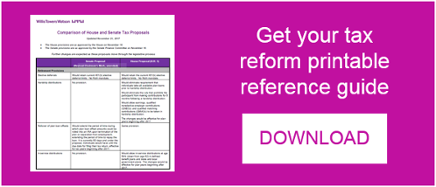Tax reform proposes big changes for businesses and individuals. As a business leader you may need to explain how tax reform impacts pay, pension and benefits. Julie Vickery, a Senior Actuary in retirement, summarizes 5 key points to help you plan your communications.
Tax reform proposes big changes for businesses and individuals, with modifications proposed for many provisions of the tax code like tax rates and deductions. As a business leader, you may have already been asked, by your boss or your employees, “What does tax reform mean for us”? Now’s the time to plan out your communication strategy. Here are a few key points:
- Cut through the confusion:
The details of tax reform are complicated. So we have created a summary for you with the downloadable reference guide.
While you could teach a master’s class in pay and benefits, your employees might need to start the discussion with more of a primer. Be prepared to sit down and walk through the basics of paycheck deductions and look at some example paychecks together. For more detailed questions, encourage employees to reach out to their tax advisors.
There may also be some misunderstandings about how their benefits may change. After all, it wasn’t very long ago that news outlets were speculating on the end of the 401(k) as we know it (“Rothification” anyone?). The pending legislation does not propose changing the amount employees can save to 401(k) plans so now might be the time to reinforce the value of saving for retirement – especially if employees might be able to spare a little extra money from their paychecks post-tax-reform.
You may also need to be prepared for questions from executives, especially about pay. Earlier versions of the Senate and House bills included and then dropped provisions that would have taxed nonqualified deferred compensation (NQDC). While NQDC remained unchanged as of the date of this post, both the House and Senate proposals currently include provisions that would make changes to the deductibility of executive pay. Check out the details in our Willis Tower Watson Executive Pay blog.
- Find creative ways your company can save:
Generally, corporate tax rates will be lower after tax reform. If your company sponsors a defined benefit or defined contribution plan and is making employer contributions, contributing to the plan before the lower rates take effect could lock in a higher deduction. Curious how this could work for a 401(k) plan? See what our Willis Towers Watson retirement experts say about prefunding 401(k) plans. For strategic discussions, include your company’s tax advisors early on so that they can help you identify the path forward for your organization.
- Will you need to pivot on perks?
Do you provide perks like dependent care assistance, educational assistance, and parking or transportation benefits? Under tax reform, the employer deductions and employee exclusions for some of these benefits may be repealed, changing the financial picture for organizations that provide them and employees that use them. Be ready to pivot if you need to reevaluate your offerings. Look for smart perks that are competitive, fit your organization, and are financially feasible.
- Stay tuned for more!
Since the legislation may be changing, keep your eye on the HR Trove Blog to find out what tax reform will mean for you and your business. Willis Towers Watson is here to support you along the way. Sign up for future posts on this and other topics at the HR Trove Blog.
- Be prepared with the details:
Negotiations in the House and Senate have resulted in two separate tax reform bills that both propose to change corporate and individual tax rates. Further changes are expected in the weeks ahead as tax reform proposals and negotiations move through the legislative process. The details are rather complex, which is why we’ve prepared a printable reference guide that summarizes the basics.


